This is the website of Abulsme Noibatno Itramne (also known as Sam Minter).
Posts here are rare these days. For current stuff, follow me on Mastodon
|
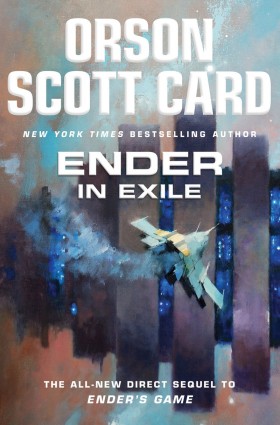 Author: Orson Scott Card Author: Orson Scott Card
Original Publication: 2008-11-11
Started: 2011-02-05
Finished: 2011-02-13
Format: Physical
380 pages / 9 days
42.2 pages/day
This is not the last Enderverse book, but this is the book that Brandy had gotten me for Christmas/Birthday/Something that had prompted me to systematically use all my fiction slots from May 2009 to February 2011 for reading all of the Ender Series books up until that point. I liked the series, but for the most part it started strong and got weaker as it went. And almost two years of no fiction other than Orson Scott Card was probably a bit much. I’m not sure I’ll give that sort of special treatment to a series again, even if I am gifted a book that is not the next in the series I have to read. After this book was read, the next Ender Series book… Shadows in Flight is on my big list of potential fiction to read but is not given any preferential place relative to anything else. Which means, at the moment, it has a 1 in 203 chance of being picked the next time I pick a fiction book to read.
Anyway, how was the book itself? Well, the whole enjoyment score I mentioned in my last post is out the window, because I read a physical paper version of this book. But my 2+ year old memory of it is basically that it was OK. Not great. Nothing special. But OK. It filled some additional gaps in Ender’s life that hadn’t been covered in the previous books, and it started typing things together with the Bean books in the series. So, fine for Ender completists, but unless you are making sure you read all the Ender books, I probably wouldn’t bother.
I can’t use the locations per day as a score, but it still can be ranked within the physical books by page per day, so lets give that a shot. The last ten books reviewed at this point are:
- 695 – Shadow Puppets (F)
- 656 – Fatal System Error (NF)
- 647 – War of Gifts (F)
- 614 – Shadow of the Giant (F)
- 446 – First Meetings (F)
- 326 – All the President’s Men (NF)
- NA – [Physical 42.2 pages/day] Ender in Exile (F)
- NA – [Physical 25.8 pages/day] Nurtureshock (NF)
- NA – [Physical 14.9 pages/day] 9 Ways to Bring Out the Best in You and Your Child (NF)
- NA – [Physical 9.08 pages/day] Agile Project Management with Scrum (NF)
And now the graphs:
% of the last 20 books I reviewed that are now available on Kindle:
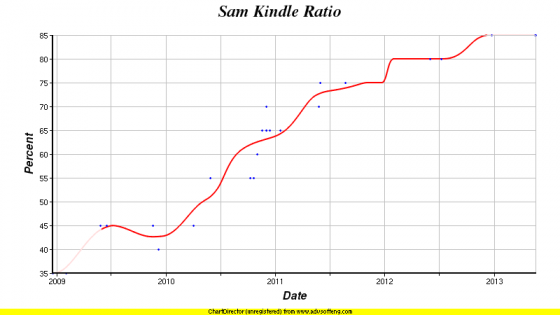
% of the last 20 books I read (including 26 I haven’t reviewed yet) that I actually read on Kindle:
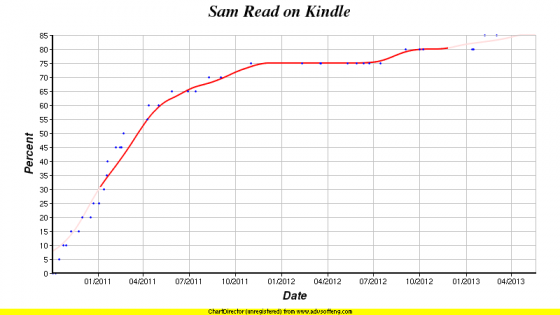
(I bought my Kindle when the first ratio hit 50%. I will do these charts until each ratio gets to 90%. We are close, but not quite there yet.)
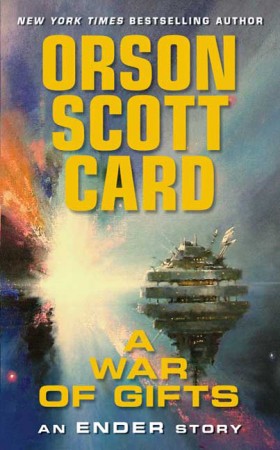 Author: Orson Scott Card Author: Orson Scott Card
Original Publication: 2007
Started: 2011 Jan 18
Finished: 2011 Jan 19
Format: Kindle
1294 locations / 2 days
647 locations/day
I continue my tradition of writing “quick” reviews of books over a year after I read them… uh, almost two years after I read them. Oops. Anyway, I guess this has value as it leaves in my head only what is fundamentally memorable about a book, not just the initial impressions.
So on Orson Scott Card’s War of Gifts, basically my memory at first blush was really weak:
- It is yet another in the Ender series. #10 in publication order.
- It is not a full novel. Maybe a novella? Really not much more than a short story.
- It has a Christmas theme.
That is about all that persisted in my memory all this time, so I reviewed the Wikipedia page to refresh my memory.
It really is an oddball little Christmas story that doesn’t fit in all that well with the rest of the series. It is like when your favorite hard rocking band comes out with a Christmas album. Some kind of effect. You end up thinking “Uh, OK. But what??”
In the end it wasn’t a bad little short story. It just seemed out of place.
The five second plot summary is that a student who is fairly religious arrives at battle school, where overt religious expression is forbidden as divisive. Hijinks then ensure over the Chirstmas season as various groups try to express their religious beliefs in various ways. Finally, Ender comes in and plays diplomat and resolves the situation.
The end.
If you are trying to be a completist and read all the Ender books, by all means this needs to be part of that. Otherwise though, I’d probably skip this.
OK, as has been my pattern, with each review, a couple of graphs regarding Kindle coverage:
% of the last 20 books I reviewed that are now available on Kindle:
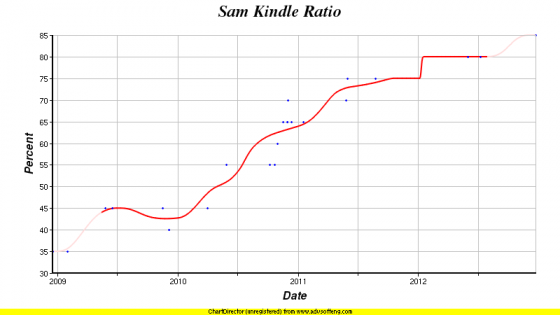
% of the last 20 books I read that I actually read on Kindle:
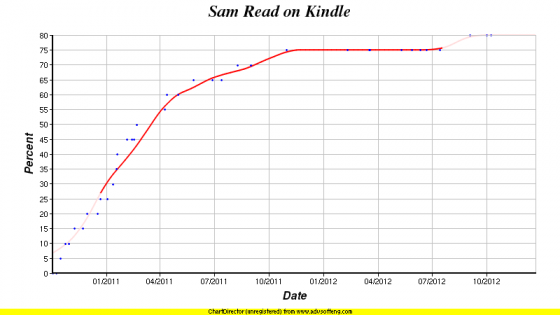
(I bought my Kindle when the first ratio hit 50%. I’ve said before that I’ll do these charts until the ratios get to 90% or so.)
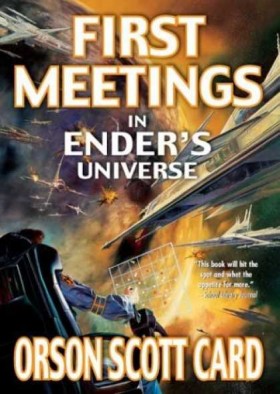 Author: Orson Scott Card Author: Orson Scott Card
Original Publication: 2003
Started: 2010 Dec 17
Finished : 2010 Dec 22
Format: Paperback
2676 locations / 6 days
446 locations / day
Up to #8 in the Ender Series. This one isn’t a novel though, but a compilation of four short stories. One is about Ender’s father as a child. One is the story of Ender’s parents meeting. Then there is the original Ender’s Game short story that Ender’s Game novel was an expansion of. And finally the story of how Ender first met Jane the sentient computer program/network.
This made it very different than reading any of the actual novels in the series. I enjoyed the two backstory ones about ender’s parents. You understand a little bit better where Ender came from, and it fleshes them out a bit. Similarly, I liked the Jane origin story, although it seemed slightly gimmicky.
The oddest one though was the Ender’s Game short story. Not that it was a bad short story, it was a good one, and of course prompted this whole series. But having it included this way was a bit jarring, since I’m reading the series in sequence, but this essentially retells the first story, but in a bit different way. It was interesting to see the differences between the short story version and the novel length version, but still, a little odd to read this as part of the overall sequence of the series.
I do like the novels better. But this was an interesting addition to the Ender Universe.
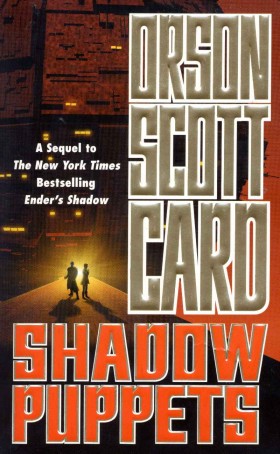 Author: Orson Scott Card Author: Orson Scott Card
Original Publication: 2002
Started: 2010 Nov 23
Finished : 2010 Nov 30
Format: Kindle
5563 locations / 8 days
695 locations / day
So, we’re now up to the 7th book in the Ender series. Shadow Puppets picks up soon after the last one ended up. But the main source of drama switches again, and the book seems to start moving back to the more philosophical sort of orientation as books 2-4 as compared to the more “things happening” sort of orientation of Books 1, 5 and 6. Which is OK I guess, but in this case a bunch of it seems to be pushing the whole “the purpose of life is to produce children” sort of agenda. Which actually started to get annoying.
The main plot point is that Bean, who is a genetically enhanced individual who gains great intelligence at the expense of abnormal growth patterns and an early death, initially intended not to have any children at all. But he is convinced otherwise. But they decide to create a number of embryos, test them for his condition, and only actually bring the ones without the condition to term. But, oh my, the people helping in this process are in league with the bad guy, and all the embryos, both with and without the condition, are stolen. Then we run around trying to get them back while also working to thwart the bad guy’s global plans.
I mean, I guess it is OK, but just a bit too much of it was centered around the “must have children, children are the meaning of life” thing. I’d say of the books in the series I’ve read, this was the weakest so far. I mean, it wasn’t horrible or anything, just not at the level of some of the others.
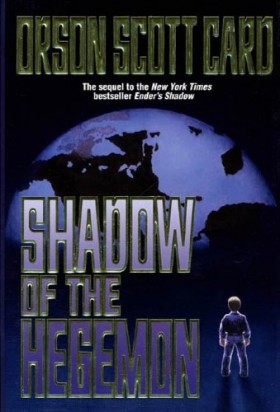 Author: Orson Scott Card Author: Orson Scott Card
Original Publication: 2001
Started: 2010 Oct 30
Finished : 2010 Nov 8
Format: Kindle
7231 locations / 10 days
723 locations / day
So here I go, I am now up to Book 6 in the Ender Series. This book once again concentrates on the character of Bean, the minor character in Ender’s Game that got a deeper background in the last book, Ender’s Shadow. Now that the Buggers / Formics have been defeated, the action shifts back to Earth, where the unity of the planet during the war against an alien threat has fallen apart, and now major geopolitical shifts are under way as national powers start reasserting themselves.
In this context, the former members of Ender’s team (including Bean) become major players, as they are considered the brightest military minds on the planet. An old rival of Bean’s from his childhood who was introduced in the last book also plays a huge part as the villain, constantly plotting for his own power, but more importantly for revenge against all those, such as Bean, who had ever seen him in positions of weakness.
There is some interesting geopolitical speculation here, looking at how a world might look several hundred years in our future, after an interlude where the planet had been forced to unite, but no longer is. But even given the premise of this cadre of super-bright children who had already saved the world, it does start to stretch the suspension of disbelief a little bit when you essentially get a handful of teenagers engaging in machinations that direct the course of major nations as they go into and out of war. It is an entertaining story, and once again Card is doing a novel that concentrates on events and actions as opposed to philosophical speculation. They are different sorts of novels. Both good in their own way.
This is maybe in the middle of the pack of the series so far in terms of how much I’ve enjoyed it. Not as good as #1, #2 or #5 in this series, but probably better than #3 and #4. Dunno. They are all enough different from each other that it is hard to compare.
Worth a read if you like this series. I wouldn’t suggest picking it up without having read at least #5 though, since it follows directly on from that book.
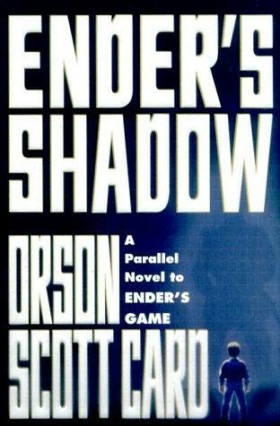 Author: Orson Scott Card Author: Orson Scott Card
Original Publication: 1999
Started: 2010 Oct 16
Finished : 2010 Oct 24
Format: Kindle
8807 locations / 9 days
979 locations / day
So here we are, continuing the Ender Series. I had thought that I had read Books 1 to 4, but had never read any of the Shadow books that start with Book 5, Ender’s Shadow. Within seconds of starting the book however, I realized that I was wrong. I had indeed read Ender’s Shadow before. While I couldn’t really remember forward, and know for sure what was going to happen on the next page or the next chapter, I did get a strong sense of familiarity with every page I read, like ongoing deja vu. Which of course is in perfect alignment with me having read this before, but many years ago. Most likely not long after it came out in 1999.
In any case, this is essentially a retelling of the same story told in Ender’s Game, but told from the perspective of one of the minor characters in the original book, namely “Bean”. In some ways Bean ends up being a more interesting character than Ender himself, if only by the mere fact that he wasn’t seemingly always the best at everything (although still at many things) and therefore had do understand and deal with his secondary role. At the same time, he was more aware of the larger context of what was going on than Ender, who was pretty oblivious to some major things, of course including the major reveal at the end of the first book. Bean on the other hand, figured out what was really going on and undertook his actions fully knowing the consequences, which in some ways made those events even more poignant.
In more general terms, as Card returns to revisit the events of the first Ender book, he also returns more to the form of a more event driven story, rather than the exploration of philosophical ideas that characterized books 2-4. And while I do enjoy those sorts of explorations, it was nice to return to a more “direct” sort of story for a bit. And it is also fun to see the same events from two radically different perspectives. This is of course a narrative trick that has been used in many different contexts before, from “Rosencrantz and Guildenstern Are Dead” to “Lower Decks” and many others, but it is still fun on occasion.
Bottom line, a good addition to the series which leaves you anticipating the next one…
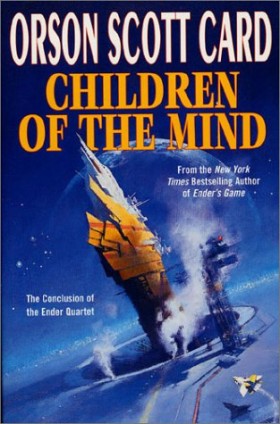 Author: Orson Scott Card Author: Orson Scott Card
Started: 3 Oct 2010
Finished: 9 Oct 2010
Format: Paperback
349 p / 7 d
49.9 p/d
OK, now that is more like it. Almost 50 pages per day and a book finished in a week. Compared to the text book before this, that is just lightning speed… Of course, I’m usually much faster with fiction and this was an easy read.
This is of course the next book (#4) in the Ender Series. I’m working my way through the series to get to #11, which Brandy gave me for Christmas or a birthday or something a couple of years back. :-) I had finished the last one back in April.
This one continues directly from the previous book with no gap in time whatsoever. It follows a couple of “characters” who are essentially just artificial extensions of Ender himself as they (and others, including the original Ender) try to prevent the destruction of a planet and a sentient computer network.
Continuing the trend of the last couple of books in this series, what goes on is decreasingly about events and actions or even characters, but instead is Card exploring a particular concept of the nature of the soul and what it means in relation to the various characters in the story, the species they belong to and toward the whole of the universe I guess. This is all an interesting thought experiment. He proposes a physical extra dimensional sort of thing that embodies the soul or the will or whatnot, and which essentially possesses physical objects, with the “stronger” of these things being able to take control of complex entities such as human beings and with the ability to “intertwine” with other of these things as embodiment of relationships between people, etc. He then pursues some of the ramifications of that sort of structure. As I said, interesting thought experiment.
Overall a good book, if you are into the kind of book that is really more about exploring ideas and concepts that being a page turner based on plot alone.
Oh, and of course, the most interesting character here continues to be Jane, the sentient computer network. But then again, I’ve always had a thing for sentient computer networks.
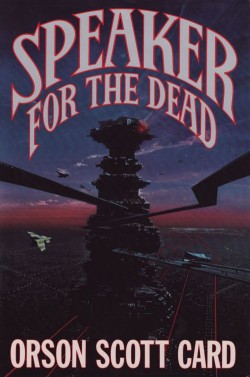 Author: Orson Scott Card Author: Orson Scott Card
Started: 1 Nov 2009
Finished: 24 Nov 2009
280 p / 24 d
11.7 p/d
So, as I mentioned when I read Ender’s Game back in May, Brandy gave me the latest Ender book last Christmas, and I decided I needed to read the whole series again, both those I’d read before and those I hadn’t, before I read the new one. So now it was time for book two.
This picks up Ender’s story several thousand years after the events in the first book (relativistic travel allows one do do that sort of thing while still living a normal lifespan). He now is a “Speaker for the Dead” and is unraveling several mysteries, one involving the life cycle of a newly discovered alien species.
The bits about how that life cycle works, and the confusion it causes in the relationship between humans and the piggies (said other species) because of lack of understanding are very creative and interesting. This is once again a book that suffers on second reading though. Even though it has been many years since I last read this book, I remembered the critical bits that meant I knew the answers to many of the mysteries from the beginning. The figuring out what was going on was, I remember, a big part of the experience of reading the book the first time around, and that was absent the second time for me.
One other big part though, that didn’t lose quite as much impact the second time around, was the concept of the “Speaker for the Dead” itself. Basically, the idea is that this is someone who does funeral orations. But not the kind where all the good aspects of the person are praised. But rather the speaker spends a good deal of time learning about the person, digging into their secrets and their dark sides as well, and then essentially “speaks the truth” telling the story of the person’s life, from childhood to their death, but not shying away from the negative or disturbing… or from the positive either… but trying as much as possible to give an honest accounting. The good, the bad, the mediocre, the things they were proud of, the things they were ashamed of, etc… The idea being that this kind of truth telling is a more powerful thing than sugar coating, and more powerful in letting the survivors understand and move on. Even if it opens wounds, it provides opportunities for healing.
Anyway, I liked that concept when I read it the first time, and I still like it. I wouldn’t mind there being a “speaking” for me when the time comes. Of course I wouldn’t mind, I won’t be there. But I like the concept. :-)
|
|
 Author: Orson Scott Card
Author: Orson Scott Card









